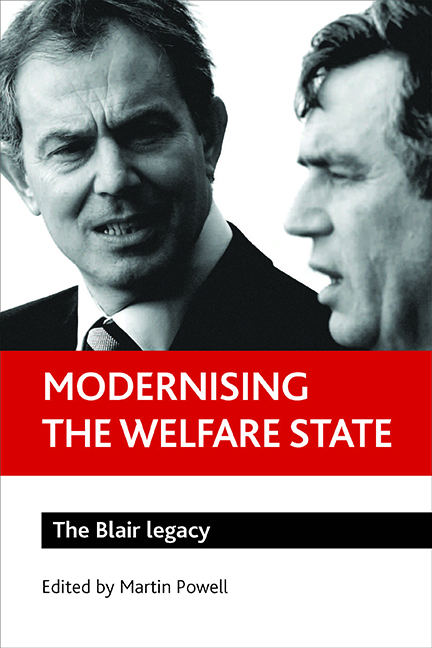Book contents
- Frontmatter
- Contents
- List of tables and figures
- Acknowledgements
- Notes on contributors
- one Introduction: modernising the welfare state
- two The NHS after 10 years of New Labour
- three Housing policy: coming in out of the cold?
- four Social security and welfare reform
- five Social care under Blair: are social care services more modern?
- six Education: from the comprehensive to the individual
- seven Controlling crime and disorder: the Labour legacy
- eight Social investment: the discourse and the dimensions of change
- nine Risk and the Blair legacy
- ten Going private?
- eleven Choice in public services: ‘no choice but to choose!’
- twelve The conditional welfare state
- thirteen The stages of New Labour
- fourteen Social Democratic reforms of the welfare state: Germany and the UK compared
- fifteen Conclusion: the Blair legacy
- Index
- Also available from The Policy Press
nine - Risk and the Blair legacy
Published online by Cambridge University Press: 21 January 2022
- Frontmatter
- Contents
- List of tables and figures
- Acknowledgements
- Notes on contributors
- one Introduction: modernising the welfare state
- two The NHS after 10 years of New Labour
- three Housing policy: coming in out of the cold?
- four Social security and welfare reform
- five Social care under Blair: are social care services more modern?
- six Education: from the comprehensive to the individual
- seven Controlling crime and disorder: the Labour legacy
- eight Social investment: the discourse and the dimensions of change
- nine Risk and the Blair legacy
- ten Going private?
- eleven Choice in public services: ‘no choice but to choose!’
- twelve The conditional welfare state
- thirteen The stages of New Labour
- fourteen Social Democratic reforms of the welfare state: Germany and the UK compared
- fifteen Conclusion: the Blair legacy
- Index
- Also available from The Policy Press
Summary
Introduction
This chapter examines risk scenarios that have been structured into New Labour policy discourses since 1997. I will argue that the approach taken to risk by New Labour, although complex and sometimes contradictory, can be understood as a feature of late modernity. New Labour, like all governments in advanced capitalist societies, is experiencing and responding to processes of ‘reflexive modernisation’ (Beck, 1992). The work of 6 and Peck will be utilised to identify emergent themes of change associated with New Labour (6 and Peck, 2004a). Central policy variables discussed by Hall will also be used to discuss the extent of changes introduced by New Labour with regard to risk (Hall, 1993).
New Labour reflexive modernisation and risk
For Beck (1992), calculating risk is part of a modern narrative in which the welfare state no longer gains its legitimacy through its capacity to protect citizens against dangers with the provision of state-funded assistance. Risk has become a ‘Systematic way of dealing with hazards and insecurities induced and introduced by modernisation itself ‘ (Beck, 1992, p 21).
Individuals in what Beck has called the ‘risk society’ are required to make major decisions about employment, education and self-identity in a world in which beliefs about class, gender and the family are being overturned (Beck, 1992; Mythen, 2004).
New Labour guru Anthony Giddens, in a similar vein, has argued that late modernity can be characterised by uncertainty about claims to truth that has led to mass insecurity (Giddens, 1998). This has been accompanied by a growing scepticism about the ability of experts to predict risk and a blurring of distinctions between lay and professional knowledge (Foster and Wilding, 2000). For Giddens, the present age is no riskier or dangerous than previous periods of history, although risks are more likely to be manufactured. Active risk taking is a core element in the creation of a dynamic economy and an essential prerequisite to participation in a technologically based global era (Giddens, 1998).
One of the problems with this position, however, is that risks are not experienced in an undifferentiated manner across groups in society. The impact of risks associated with flexible working patterns and the maintenance of family life have a disproportionate reflexive impact on the lives of poorer people (Taylor-Gooby, 2000).
- Type
- Chapter
- Information
- Modernising the Welfare StateThe Blair Legacy, pp. 143 - 160Publisher: Bristol University PressPrint publication year: 2008



